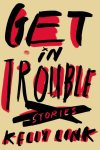RA Alert: Slipping into Slipstream with Kelly Link
 Kelly Link’s new collection, Get in Trouble (Random House, Feb. 2, 2015; OverDrive Sample), her first for adult readers in over a decade, is getting widespread attention, and strong reviews, in sources ranging from NPR to Salon to The LA Time’s “Jacket Copy,” which says readers will be “hopelessly engaged” in the stories. The Salon review matches that glowing tone by asking if any author has “a better, deeper instinct for the subterranean overlap between pop culture and myth?”
Kelly Link’s new collection, Get in Trouble (Random House, Feb. 2, 2015; OverDrive Sample), her first for adult readers in over a decade, is getting widespread attention, and strong reviews, in sources ranging from NPR to Salon to The LA Time’s “Jacket Copy,” which says readers will be “hopelessly engaged” in the stories. The Salon review matches that glowing tone by asking if any author has “a better, deeper instinct for the subterranean overlap between pop culture and myth?”
Link’s collection focuses attention on a genre that is as popular as it is hard to define: Slipstream.
Picking up on the swell of interest, The Wall Street Journal profiles Link while also exploring the popularity of the genre, which they define this way:
The label slipstream encompasses writing that slips in and out of conventional genres, borrowing from science fiction, fantasy and horror. The approach, sometimes also called “fantastika,” “interstitial” and “the New Weird,” often feathers the unexpected in with the ordinary, such as the hotel in Ms. Link’s new collection of stories Get in Trouble, where there are side-by-side conferences, one for dentists and another for superheroes in save-the-world costumes and regalia.
Hats off to the WSJ for offering a cogent and manageable definition (even though it is sure to continue the debate of just what Slipstream is).
The article goes on to offer even more help to readers’ advisors by supplying a list of example titles and some reasons for the genre’s popularity.
The Bone Clocks by David Mitchell, Tenth of December by George Saunders, Swamplandia! by Karen Russell, The Particular Sadness of Lemon Cake by Aimee Bender, and Jeff VanderMeer’s The Southern Reach trilogy are all mentioned.
Explaining the interest, John Kessel, co-editor of the slipstream anthology Feeling Very Strange, writes, “I think one reason this kind of fiction has become more popular is that the world doesn’t make a lot of sense to a lot of people … So fiction that suggests that the world is inexplicable, but that there is some feeling of connection nonetheless, speaks to people.”
